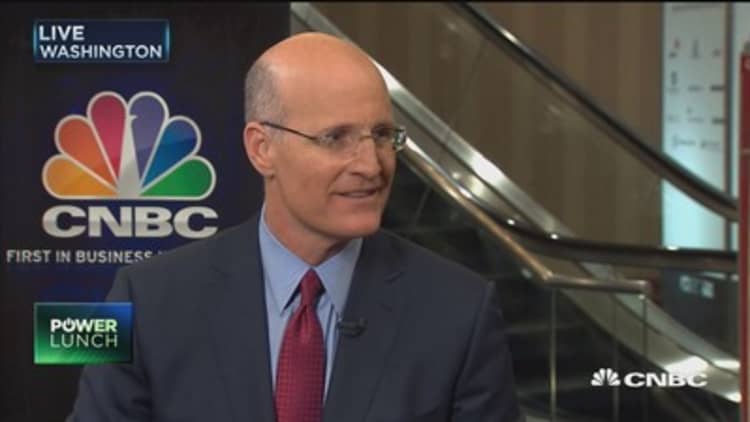Not all target-date funds are created equal.
While these funds have ballooned in popularity as set-it-and-forget-it retirement fund options, financial advisors say it's important to look under the hood when choosing one.
"There are lots of factors that determine whether or not a target-date fund is a good fit for your goals," said Steve Burkett, a certified financial planner with Palisade Investments. "Make sure you explore beyond the fund name to determine if the fund is a good fit for you."
These funds, whose assets automatically shift to more conservative investments as individuals approach retirement, have become a staple in many 401(k) plans. Their assets stood at $739 billion as of Aug. 31, more than twice the $342 billion they held at year-end 2010.
They get their names from the year in which an investor anticipates retiring.
For instance, investors in a 2050 fund today will watch their assets gradually move away from riskier investments, such as stocks — which come with the potential for higher returns — to more conservative options, such as bonds and cash, the closer they get to 2050.
So on the surface, one 2050 fund might appear very similar to another 2050 fund. But when you dig a bit deeper into the 60 or so target-date fund families, things like performance, cost and investment philosophy all come into play if you are trying to choose one that best suits you.
"There are basic questions that can help you narrow the field," said Janet Yang, director of multi-asset strategies for research firm Morningstar, which rates target-date funds based on a variety of criteria.
For starters, she said, you can choose between passively managed or actively managed. While all target-date funds invest in underlying assets, passive target-date funds invest in index funds; active funds invest in funds that have professional stock pickers at their helm.
There are a few reasons why active vs. passive can matter, industry experts say.
Passive funds come with lower fees because they basically invest in index funds, which mirror the performance of an index, so a human stock picker is not being paid for expertise.
"Passive is always cheaper," said Kevin Couper, a CFP and financial advisor with Sontag Advisory. "But you have to weigh that lower fee versus what you're getting. … Passive funds might be a little more volatile because you're riding along with the [performance] of the stock market."
If you are more skittish about [volatility] or if August had you selling your holdings, then there's a good chance a more conservative fund would be better.Janet Yangdirector of multi-asset strategies at Morningstar
And that leads to another consideration: your risk tolerance. In simple terms, risk tolerance is about how well you can stomach big drops in the stock market without panicking.
For instance, in August the — generally viewed as the broadest gauge of the stock market's performance — lost more than 6 percent.
"If you are more skittish about [volatility], or if August had you selling your holdings, then there's a good chance a more conservative fund would be better," said Yang at Morningstar.
That ties into the so-called "glide path" of these funds.
Basically this is industry jargon that describes how the asset mix changes the closer you are to the target date. Some funds allocate more to equities early on than others, and some continue having a more aggressive — i.e., stock-heavy — allocation up to or past the target date.
"That can help guard against inflation risk and [life] longevity, but you also have more market risk," Yang said.
Another aspect to consider is whether the fund is a "to" or "through" fund. To funds reach their most conservative point at the target date, while through funds continue to reduce their exposure to stocks for a set number of years after the target date.
Advisors say they look carefully at target-date funds before recommending them to retail investors or to 401(k) plan sponsors. While advisors can access detailed reports and pore through them, retail investors have more limited access unless they want to pay for it. At Morningstar, an investor can check up how a fund ranks, although it won't include the detailed information behind the ranking.
Comparing the performance of individual target-date funds is tricky, because if the market drops, a 2060 fund with 90 percent in stocks is obviously going to fare worse than a 2016 fund with 50 percent stocks. Conversely, if the market is on a bull run, that same 2060 fund will perform better than the 2016 fund.
Similarly, comparing one 2016 fund to another is hard because the allocation to stocks is so different among those funds.
Overall, Charles Schwab, Vanguard, T. Rowe Price and TIAA CREF are the companies offering target-date funds that have earned at least four stars (out of five) by Morningstar.
Couper, at Sontag Advisory, said he tends to prefer Vanguard, TIAA CREF and State Street target-date funds.
First off, he said, he likes their passively managed funds.

"We think over time they'll outperform [actively managed] funds," Couper said. "And their fees are lower."
Morningstar data show that Vanguard target-date funds come with an average expense ratio of 0.17 percent; TIAA CREF, 0.15 percent; and State Street, 0.62 percent.
Also, he said he likes the risk profile of those funds. They start for a young investor with about 90 percent in equities, and by age 65 they're invested in about 50 percent equities.
"We like that trajectory and the glide path," Couper said.
Overall, advisors say that sticking with well-known investment managers with a good track record also should play into your decision.
Burkett, at Palisade Investments, pointed out that you don't want to pick a fund that could end up shuttering.
"I think you're in good hands with the bigger names," he said.
—By Sarah O'Brien, special to CNBC.com







